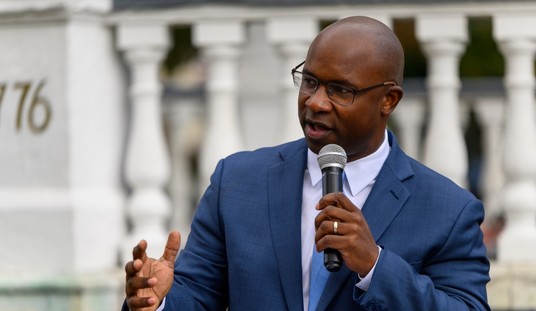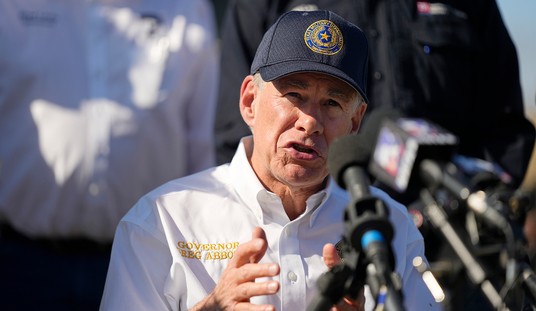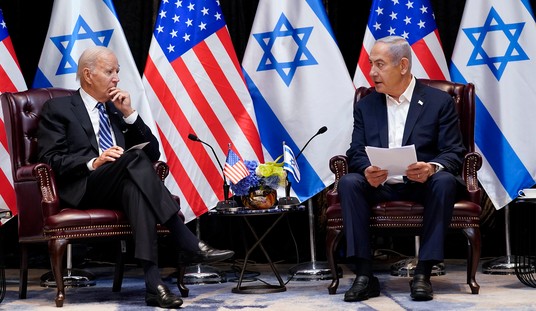I think I know what this week’s partisan culture-war conflict is going to be. Tucker’s monologue tomorrow night will be lit.
There’s no video of this yet as of noon ET but there are photos:
Olympic hammer thrower Gwen Berry turns her back on US flag during national anthem https://t.co/YRfgo5QQ39 pic.twitter.com/XXwBDoj3vG
— Daily Mail US (@DailyMail) June 27, 2021
As the national anthem played while Gwen Berry was on the podium after qualifying for the Olympics, she turned away from the flag and draped a T-shirt with the words "Activist Athlete" over her head.
She felt the timing of the anthem was "a setup": https://t.co/cE22DCQCxB pic.twitter.com/HPPnR2xXyr
— SportsCenter (@SportsCenter) June 27, 2021
The Daily Mail has additional pics of what happened at the Olympic track-and-field trials held this past week in Oregon. Gwen Berry’s event is the hammer throw; she didn’t win but she did take bronze, which was good enough to punch her ticket to Tokyo. “The Star-Spangled Banner” isn’t played during podium ceremonies at the national trials for the obvious reason that everyone competing is American. But they do play it once daily — and yesterday it happened to occur at the moment the medalists in the hammer throw were on the podium.
Berry, an outspoken activist who’s been sanctioned once before for demonstrating at track events, thought that wasn’t a coincidence:
Gwen Berry turned away from the American flag and raised a T-shirt over her face as the national anthem played Saturday, minutes after she qualified for the Olympic team at the U.S. track and field trials in Eugene, Ore. Berry has demonstrated on the podium before, but her impromptu protest Saturday came only after what she called a “setup” by meet officials…
“I feel like it was setup,” Berry said with a burst of laughter. “I feel like they did that on purpose, and I was pissed, to be honest. I was thinking about what should I do. Eventually, I just stayed there and just swayed. I put my shirt over my head. It was real disrespectful. I know they did that on purpose, but it’ll be all right. I see what’s up.”…
“It was funny because they said they were going to play it before we walked out,” Berry said. “It just happened they played it when we were out there. So, you know, it’s okay. I really don’t want to talk about the anthem because that’s not important. The anthem don’t speak for me. It never has.”
It almost certainly was a coincidence. They’ve been playing the anthem to mark the start of the evening session at around the same time all week. Yesterday it was scheduled to play at 5:20 p.m. local time and ended up playing at 5:25, when Berry was on the stand. She can’t possibly believe that the U.S. Olympic Committee wants the distraction of a bitter political controversy weeks before the Tokyo games start, to the point where they’d bait her by waiting to play the anthem until she was on the field.
And yet she does seem to believe that.
As I say, she’s protested before at events. Two years ago at the Pan American Games she took gold in the hammer throw and reacted this way:
U.S. hammer thrower Gwen Berry raises her fist at the end of the national anthem at the Pan Am Games today. (h/t @sergeta) pic.twitter.com/gnBCEEDN1m
— Nick Zaccardi (@nzaccardi) August 11, 2019
The U.S. Olympic Committee put her on probation for a year for that, as political demonstrations on the field were forbidden under the rules. But then they had a change of heart. Last summer, in the thick of national BLM protests, the Committee apologized to Berry. In March of this year, they formally changed the rules. Protests are now permitted if they’re aimed at “promoting the human dignity of individuals or groups that have historically been underrepresented, minoritized, or marginalized in their respective societal context.” That means kneeling during the anthem, raising a fist, or wearing BLM or pro-trans gear. Berry took advantage a few days ago, raising her fist at the Olympic trials on Thursday. So did U.S. track star Noah Lyles, who wore a black glove when he made the gesture during introductions at the same event.
The problem for Berry and Lyles is that the International Olympic Committee, which will oversee the Tokyo games, hasn’t changed its policy banning demonstrations yet. The head of the IOC, Thomas Bach, stated his opposition to political activism on the field in an op-ed last October but had a self-serving motive for doing so. Bach’s organization is facing potential boycotts by western nations of the 2022 Winter Olympics in China to protest the CCP’s human-rights abuses. His strategy for heading that off is — or was — to insist that the games should be studiously politically neutral. It’s all about sport:
The Olympic Games are firstly about sport. The athletes personify the values of excellence, solidarity and peace. They express this inclusiveness and mutual respect also by being politically neutral on the field of play and during the ceremonies. At times, this focus on sport needs to be reconciled with the freedom of speech that all athletes also enjoy at the Olympic Games. This is the reason there are rules for the field of play and the ceremonies protecting this spirit of sport. The unifying power of the Games can only unfold if everyone shows respect for and solidarity to one another. Otherwise, the Games will descend into a marketplace of demonstrations of all kinds, dividing and not uniting the world.
Are Bach and the IOC sticking with that for the Tokyo games? Maybe not: “The International Olympic Committee (IOC) Athletes’ Commission is discussing granting athletes permission to demonstrate – including raising a fist or taking the knee – at specific times and in certain areas before their competition at the Games,” one website reported two days ago. The key bit is “at specific times and in certain areas.” Supposedly, under the new proposed rules, demonstrating on the podium will remain banned. Which makes me wonder if the IOC is offering half a loaf to activist athletes like Berry and Lyles in hopes of heading off a larger controversy. Berry told reporters yesterday that she’ll figure out a way to demonstrate in Tokyo. Bach may be thinking that the least bad outcome at this point is accommodating that impulse in exchange for channeling it away from the podium, the moment when athletes have maximum visibility.
The question is why Berry would want to represent a country at the Olympics for which she has so much contempt that she can’t face its flag during the playing of its national anthem. “The anthem don’t speak for me. It never has,” she told reporters. That’s fine, but the Olympics isn’t the NFL. It’s an international competition with national glory at stake. If she’s ashamed to be an American, why not sit out the Games? Or why not petition to compete as an “independent athlete,” which the IOC allows in certain political circumstances?
Last year, in a video for the New York Times, she defended her desire to demonstrate during sports events on grounds that athletes aren’t just athletes. They’re human beings with political opinions. “Every athlete believes something,” she says. Right — and even so, most Olympic athletes don’t prioritize their beliefs over honor for their country at the Games. Berry’s different.







Join the conversation as a VIP Member